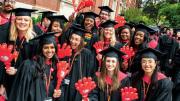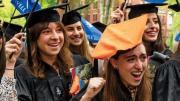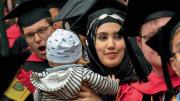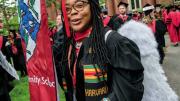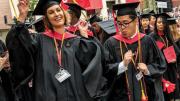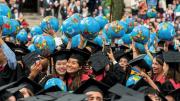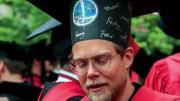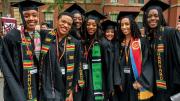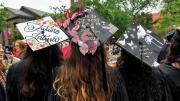Concluding the year in which Harvard transitioned from its first woman president to its twenty-eighth man to hold the office, the University showcased a dazzling array of female leaders during the 368th Commencement, May 28-31. Their spheres of action ranged from the pinnacle of elected office to grassroots crusades for fundamental rights: the principal speaker, German chancellor Angela Merkel; president emerita Drew Gilpin Faust, an honorary-degree recipient; a public-interest lawyer; a labor organizer; the past president of Planned Parenthood; U.S. poet laureate Tracy K. Smith, the chief marshal; and the brave pediatrician who exposed the lead water pipes that threatened the health of the poor citizens of Flint, Michigan.
Their gender may have been irrelevant: the chance result of many Harvard tubs severally selecting apt speakers and honorands. But collectively, they and other important guests during the week conveyed a significant message about engaging in civic life, fighting for fundamental values, and—of increasing importance to the University and to that new president, Lawrence S. Bacow—modeling, and really meaning, service in some cause larger than oneself.
Much of the week was cool and gray—and perhaps a metaphor for the prevailing temperament.
Tuesday morning, the Phi Beta Kappans queued up for the annual Literary Exercises in Sanders Theatre, just in time to get moistened, to and fro. Poet Dan Chiasson, Ph.D. ’01, knowing his audience well, presented them with a new poem titled “The Math Campers.” Orator Eric Lander—faculty member, genomics pioneer, and founder and leader of the Broad Institute of MIT and Harvard—spoke seriously about science and knowledge. But his paean to discovery was anchored in concern about “failures of imagination,” the inability to conceive “What could possibly go right? and What could possibly go wrong?” in the very contemporary realms of genetic engineering (“modified babies with new traits”) and computer science/artificial intelligence/social media (enabling “some governments to become surveillance states” and the dissemination of “fake images, audios, and videos”).
Other figures returned to familiar Harvard haunts as well, to raise equally weighty concerns. Fiftieth-reunioner Al Gore ’69, LL.D. ’94—the College’s Class Day speaker on Wednesday afternoon, his third Tercentenary Theatre address—warned about climate change, his chief issue for a quarter-century. He earned cheers for advocating divestment from fossil-fuel holdings (as the Corporation and administration have declined to do; the cause is popular among students, some of whom chanted “Divest—and reinvest” after earning their degrees). His larger theme was the national discourse. “Veritas—truth—is not only Harvard’s motto emblazoned on so many of these banners here today,” he began. “But it is also democracy’s shield, and the right to pursue truth is the most fundamental right of them all. That right is now at risk. And as a result, freedom itself is at risk.” Amplifying, he said, “Supporters of authoritarianism define loyalty to America’s core principles as treason against its new would-be sovereign.” A desire for more power “explains the appeal to would-be autocrats of multiple ‘bromances’ with extreme authoritarians—at least one of whom…has been allowed to sink his teeth into America’s democratic electoral process and play with it like a chew toy.”
At the Business School, Michael R. Bloomberg, M.B.A. ’66, LL.D. ’14, instructed the M.B.A.s-to-be that capitalism fared better when bosses treated their employees well, conducted themselves with integrity, embraced philanthropy, and, yes, showed some awareness of matters like climate change.
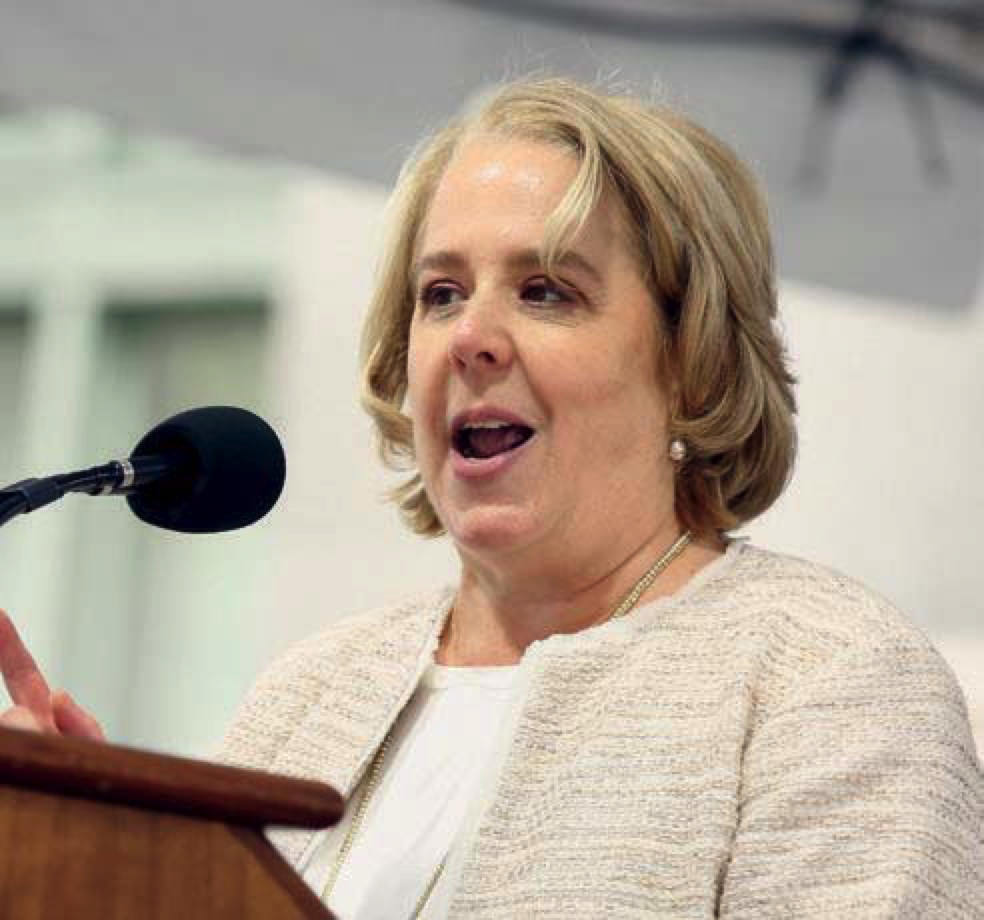
Roberta Kaplan
Photograph courtesy of Harvard Law School
But the real pride of place belonged to newcomers who did not exert leadership from past positions of power or (earned) wealth. Roberta Kaplan ’88 told the Law School crowd that “As a closeted high-school student in Cleveland, Ohio, in the early 1980s; as a closeted college student here at Harvard in the mid 1980s; and as an only slightly-less-closeted law student at Columbia in the late 1980s,” it had taken personal bravery for her to acknowledge her identity—and then to take on litigating United States v. Windsor, which undid the Defense of Marriage Act. Foreshadowing Merkel, she said “[I]f you believe that it is possible to break, believe that it is possible to repair.”
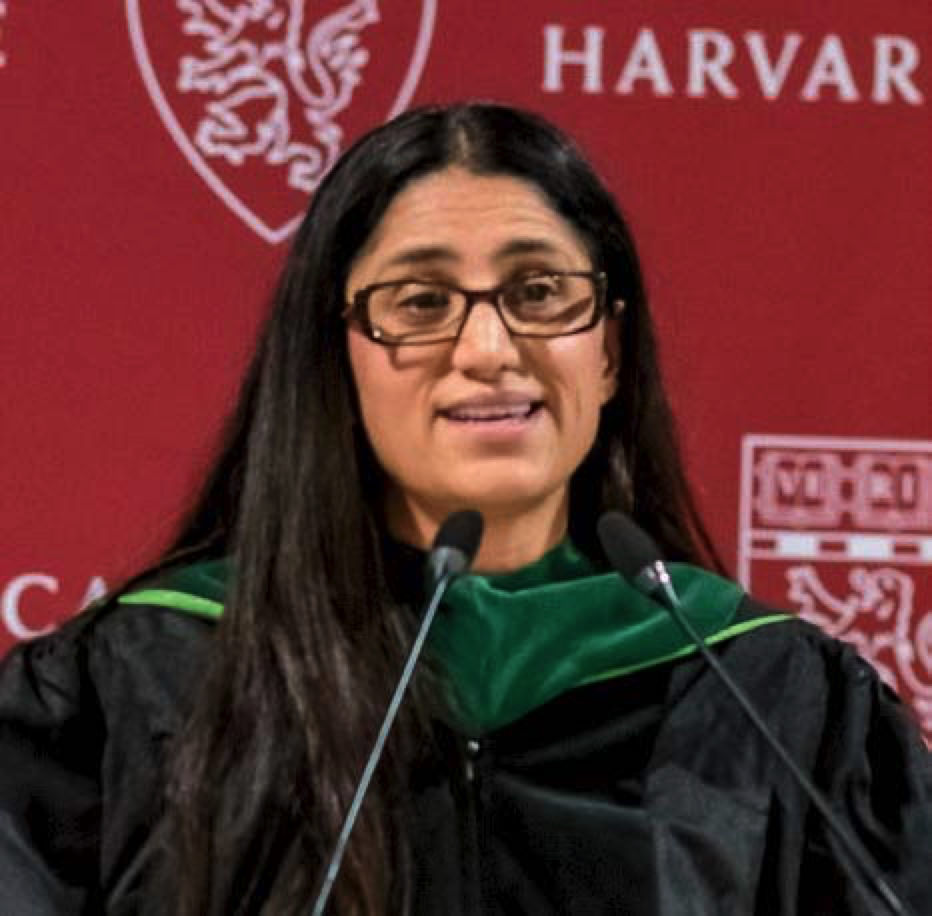
Mona Hanna-Attisha
Photograph by Steve Lipofsky/Harvard Medical School
During a month when several states (including some with unaddressed crises in maternal health and infant mortality) acted to curtail or outlaw abortion, Cecile Richards, former Planned Parenthood leader, told public-health students they must choose “the path of most resistance”—not simply practicing their chosen profession, but embracing activism: “I hope that every single one of you is thinking about running for office.” Proving that successful advocacy need not depend on holding office, Mona Hanna-Attisha told the Medical and Dental School graduates Thursday afternoon that when she publicized her findings about the poisoning of Flint’s water supply (the result of a financial overseer’s decision to save money), she was “met with denials and attacks,” called “wrong” and “hysterical,” and even briefly regretted her decision to speak up. But she persevered because “Every single number in my research was a child, children that as a physician I have literally taken an oath to protect.” And Radcliffe Medalist Dolores Huerta (honored on Friday, the fairest day of the week, the weather gods’ gesture to the women of and at Harvard), proceeded against even longer odds, from a position of even lesser authority, when she co-founded the United Farm Workers of America. She works with people, she said, who “may not speak English, they may not be citizens of the United States, they might be very, very poor….But the one thing is…that the power is in our person.”
Where do people find the strength to undertake the risky work of pursuing what’s right? General Mark A. Milley, Chief of Staff of the U.S. Army, told the ROTC cadets about the importance of character within an organized institution like the military (excerpted here). And student orators Genesis Noelia De Los Santos Fragoso ’19 and Lucila Takjerad, M.P.A. ’19, galvanized the Morning Exercises throng with their personal journeys (from a Boston housing project and civil war in Algeria, respectively), abetted by family, friends, and strangers’ small acts of kindness. The messages of human diversity and humane inclusion could not have been embodied more strikingly.
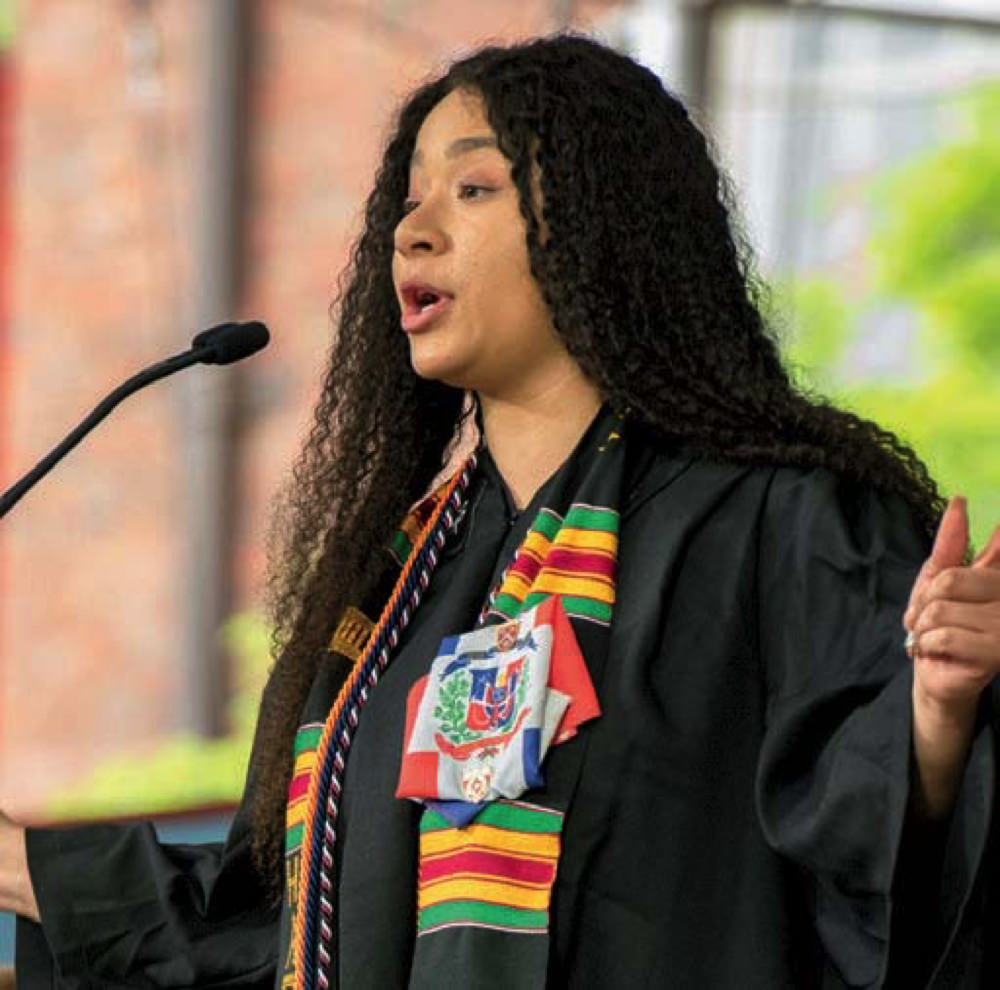
Genesis Noelia De Los Santos Fragoso
Photograph by Jim Harrison
Under cloudy but ideally comfortable conditions, especially for those swathed in academic duds, the honorary degrees conferred thereafter extended the metaphor—and reinforced the spectrum of issues on the University and world agendas. The exemplars recognized ranged from a stellar curator of the African-American experience and a social anthropologist who changed the understanding of gender to a leader in explaining economic inequality and a preeminent practitioner of factual journalism.
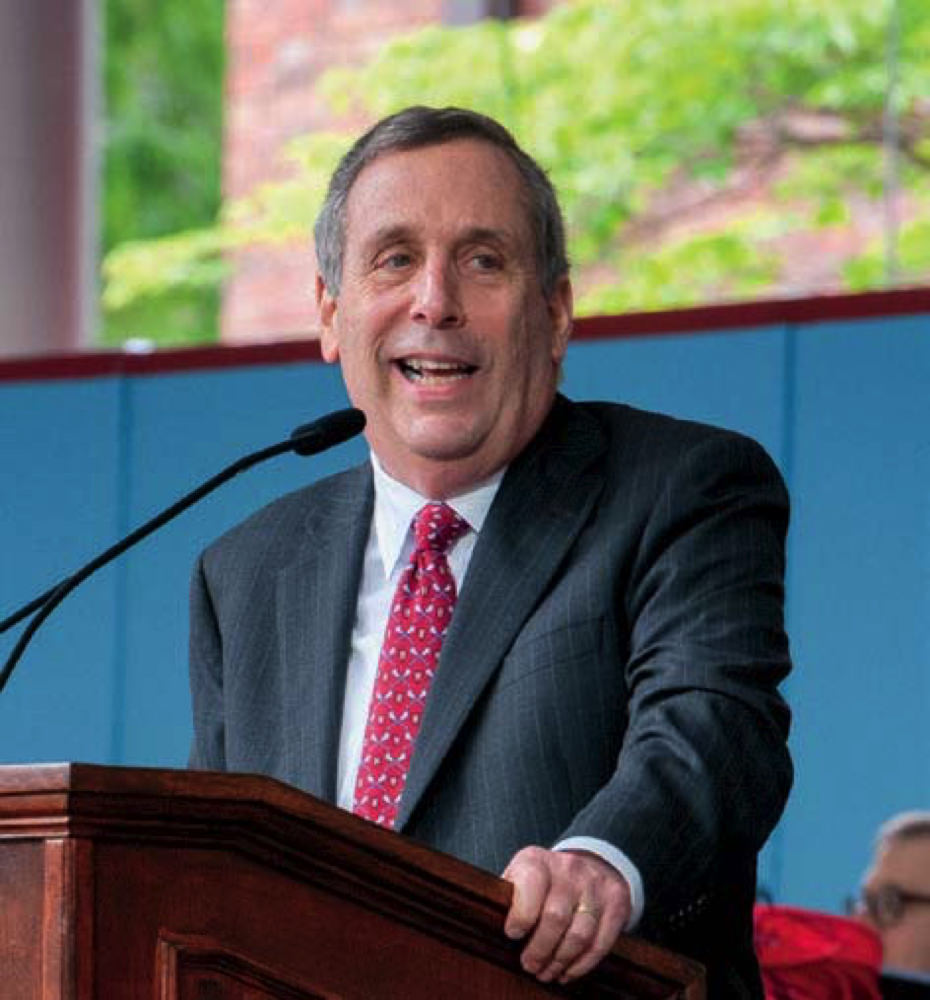
Lawrence S. Bacow
Photograph by Jim Harrison
In his afternoon address, President Bacow, deliberately brief to reserve time for the guest speaker, outlined many of the challenges sounded during the week: “the coarsening of public discourse”; gun violence; “the existential threat posed by climate change”; and “the scourge of sexual harassment and sexual assault”—including at Harvard. Yet in his immersion in the University and its people he found a “spirit of hope—the willingness both to see the world as it is, and to consider how we can help make it better” through the action “of both knowledge and education at work in the world.” In place of the concerns about external threats to higher education that he voiced during his installation last year, he seemed buoyed by examples of Harvard people engaged in bettering humanity—both for their innate value and for their role in justifying institutions like the University, in the face of continuing skepticism.
In her address, Chancellor Merkel if anything broadened that theme (excerpted here). She recalled the Berlin Wall of her youth, when East Germany spied on its citizens and shot them as they sought freedom. And then, in 1989, “Something which many people, including myself, wouldn’t have believed possible, became reality”: the Wall came down, and, she learned, “Anything that seems to be set in stone or inalterable can, indeed, change.” That opening of possibilities led to other life lessons she imparted—ones deeply aligned with the values of a university. In effect, she delivered not a program, but a comprehensive critique of fearmongering, inwardly directed nationalism, and other limiting habits of mind—newly prevalent, it went without saying, in this country, and on the rise in her own.
The day before, Juan Manuel Santos, M.C./M.P.A. ’81, NF ’88, who was awarded the Nobel Peace Prize for his role as president in bringing Colombia’s horrific civil war to an end, had told his Kennedy School audience that “what seemed impossible became possible” in his country through “good will, perseverance, courage, adequate planning—yes—but above all, by recognizing each other as human beings.” Drawing on her very different life and leadership experience, Merkel told her huge audience, “Do we prioritize people as individuals with human dignity and all their many facets? Or do we see in them merely consumers, data sources, objects of surveillance? These are difficult questions. I have learned that we can find good answers even to difficult questions if we always try to view the world through the eyes of others. If we respect other people’s history, traditions, religion, and identity. If we hold fast to our inalienable values, and act in accordance with them.”
It seemed the perfect message, hard-earned, not only for the day and the place, but for these times, and the ages.
